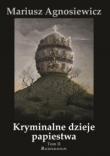
|
« Letters and opinions The Polish Brethren and the Founding Fathers To: Kaz Dziamka, Editor The American Rationalist Drogi Panie My name is W. Paul Tabaka, from Poland, presently in Los Angeles, California. I have found your page upon search for 'Sierakowski Socinian' via Google. What would Jefferson and Madison in Warsaw [sic]. While I had not read your article on „Jefferson and Madison in Warsaw" throughout, it seems to me that I would largely support your propositions. What is missing in it are certain Polish traditions of rationalist thought, namely the Polish Brethren. (At least I had not spotted at trace of your mentioning them) : the Fratres Polonorum, or anti-Trinitarians, also called Socinians and ultimately called Unitarians. If you had made some time for brief examination of some of my recent notes : http://www.geocities.com/paultabaka/socinian.html http://geocities.com/paultabaka/unitarian.html the entire directory http://geocities.com/paultabaka can also be browsed through You might note the strong tradition of religious liberty coming from nowhere else than Poland. John Locke was preceded by a few decades by Samuel Przypkowski on tolerance, by Andrzej Wiszowaty on 'rational religion'. Newton had met Samuel Crell of the Spinowski family (originally Krell from Germany). Englishman John Bidle had translated two works by said Przypkowski ; also the Racovian Catechism ; and a work by J. Stegmann, a „Polish Brother" from Germany. Bidle's followers had very close relations with the Polish Socinian family of Crellius (aka Spinowski). Pleae note http://geocities.com/paultabaka/stuckey.html Subsequently, the Unitarian branch of Christianity was continued with by, most notably, Joseph Priestley, who had emigrated to the U. S. A. and was a friend of both James Madison and Thomas Jefferson whom you mention. Jefferson had claimed to be a 'Unitarian' and credited Priestley with having converted him onto that faith. You may note that Priestley was very well informed on the earlier developments in Poland, especially by his mentions of Socinius and Szymon Budny. While I would have no notion — how exactly to use these data in the context of Polish conditions these days, I am yet sure that they can be relevant. Please let me know what you think. Mine being an on-going research, there are more data which I had not yet entered into my pages. Sincerely, W. Paul Tabaka * Nov. 26, 2003 Dear Mr. Tabaka, Thanks for your letter of Nov. 19. I don't see why I should include in my essay what you describe as „rationalist thought" of the Polish Brethren, who after all were Christians. I don't define „rationalism" in such a liberal manner, a logical flaw I consider a contradiction in terms. Also, my paper is focused on what Madison and Jefferson would do today to help design Polish democracy. I am not interested in what the Polish Brethren would do or say. Unitarians, both Polish or American, are allies of religious humanists perhaps, or are believed to be such allies. But they are not intellectual allies of secular humanists, who insist (and I agree, of course) that secular humanism is not a religion in any meaningful sense. Another thing that I find objectionable in your letter is your statement that „the strong tradition of religious liberty come[s] from nowhere else than Poland." This idea to me is a persistent Polish myth that religious tolerance is the same as religious liberty and that Poland's tradition of religious tolerance was unprecedented and became an inspiration for the Founding Fathers. There is no evidence that such a claim is hardly more that wishful thinking. You also admit that you have not read my article "throughout," an admission I find rather disappointing. Why bother to critique anything if you have not read it throughout? But I will check out the websites you have recommended. I am always open to new knowledge. Regards,
« Letters and opinions (Published: 29-11-2003 )
page 3098 |
||||||||||||||||||||||||||||||||||||||||||||||||||||||||||||||||||||
| [ Cooperation ] [ Advertise ] [ Map of the site ] [ F.A.Q. ] [ Store ] [ Sign up ] [ Contact ] The Rationalist © Copyright 2000-2018 (English section of Polish Racjonalista.pl) | ||


